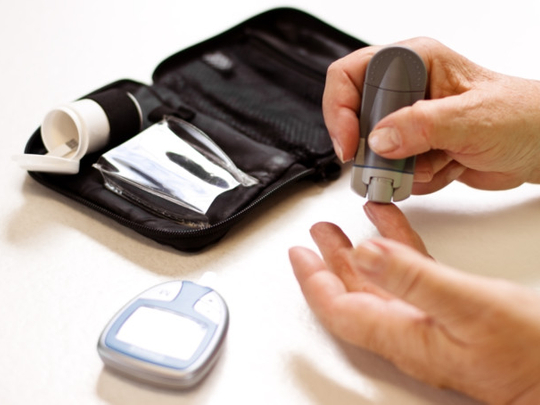
A positive result on your sugar test does not mean you are barred from all the goodies on the planet. It just means you need to be careful about what you eat and how much you tuck into. Though diabetes is a common ailment, there are still many misunderstandings that people have about this condition. As a result, people often do more harm than good when they try to monitor their diets without proper advice from qualified health professionals.
Emilie Hartmann, Dietician at The Dubai Mall Medical Centre, says, “One of the main myths that I have to often correct is that eating sugar causes diabetes. This isn’t so. Type 2 diabetes (also called adult-onset diabetes, the most common type) is caused by genetic and lifestyle factors. Being overweight or obese is a major risk factor for developing type 2 diabetes — eating too much sugar is not. When we eat too many calories, whether from sugar or fat, and do not burn them, the body stores it as fat and this fat excess might progressively prevent the body from using insulin properly.
“A person who is diabetic can consume sugar but only less frequently and in small portions, as part of his healthy meal plan. He should also monitor his sugar levels when he does so. Adding a short walk or a refreshing swim to a day which has seen larger calorie consumption is a good idea,” she adds.
Dietary options
People think that diabetics need to consume special kinds of foods while in reality they have the same nutritional requirements as others. “All they need to do is follow a healthy meal plan, monitor their carbohydrate intake (the food type that raises blood sugar levels) and manage the balance between the number of calories they eat and burn to keep a healthy weight.”
Quick foods
“Over-the-counter foods available for diabetics usually offer no special benefit; they are often more expensive than the normal product and some even have hidden fats or sugar alcohols to make them tastier,” Hartmann warns. “This can be unhealthy. So the best alternative is to eat a healthy variety of foods.”
Another common myth that is quite popular in this region is that eating dates will not affect sugar levels. “Dates are fruits, they contain fructose. It is the naturally occurring sugar in fruits and is easy to digest, but it is sugar all the same. It also raises sugar levels in the blood in diabetic people. One cannot consume dates mindlessly thinking that it will not affect sugar levels. But dates are rich in fibre and a good source of potassium and iron, so enjoy fresh dates but in moderation — two dates contain the same amount of sugar as one apple or a cup of cantaloupe melon.”
Dr Sameem Mattoo, Specialist Endocrinologist at Canadian Specialist Hospital, says, “Diabetes is a chronic disease; it is not a life sentence. Indeed it has no cure, but people can definitely live an active and enjoyable life if they learn to manage it.”
Diabetes management includes blood glucose monitoring, regular physical activity, eating healthy but controlled food portions, taking medicines in some cases and being aware of the condition. “Work closely with your health-care provider,” Dr Mattoo says. “Sugar levels can sometimes be difficult to manage, but it is not impossible. Don’t resort to off-the-shelf diabetic foods, it is of no help. Instead choose a healthier diet, eat simpler foods and monitor portion sizes as well as frequency of meals, and be physically active most days of your week.”
Liquid dangers
Living with diabetes doesn’t mean feeling restricted in your food habits. However, it is extremely important to be aware about the nutritional content of foods. This also holds true for any beverages consumed. “It can be harder to keep blood sugar levels within normal ranges with drinks containing sugar, such as soda, fruit juices, sports drinks and tea or coffee with added sugar. Being liquid and very concentrated in sugar, they are easily absorbed into the blood and cause an elevation of sugar levels. So avoid sweetened drinks and use plain water to quench your thirst. You can have an occasional fresh fruit juice with one of your meals, but most of the time, prefer the real fruit to the juice,” Dr Mattoo says.
Gestational diabetes
There are also a lot of false beliefs regarding gestational diabetes, says Dr Yasmeen Ajaz, Specialist Physician at Belhoul Speciality Hospital Dubai. “The tendency to overeat and rest often can be the main cause for elevated blood sugar levels in pregnant women. Hormonal changes during pregnancy may also be responsible for this insulin resistance. If you are planning to start a family and want to limit your risk of developing this type of diabetes, try to maintain a healthy body weight even before the onset of pregnancy. Remain active throughout the term. Eat twice as better, not twice as much!”
An increase of 10-16 kilograms of weight during the period of pregnancy is healthy for women who have a normal BMI at the beginning of their term, says Dr Yasmeen. However, those who are overweight should not put on more than 11kg on their original weight, and not more than 7kg in case of obesity. This helps the body to remain in its routine spectrum, thus making it easier to lose those extra kilos post delivery.
“While sugar levels can drop back to normal after delivery, the possibility of the baby having diabetes (later in life) increases if he is overweight,” Dr Yasmeen says. “It is therefore important that expecting mums maintain their sugar levels by eating wisely. Using medication and/or insulin during pregnancy must be a last resort.”











